Straight No Chaser magazine
Various features and reviews written from 2004
Various features and reviews written from 2004
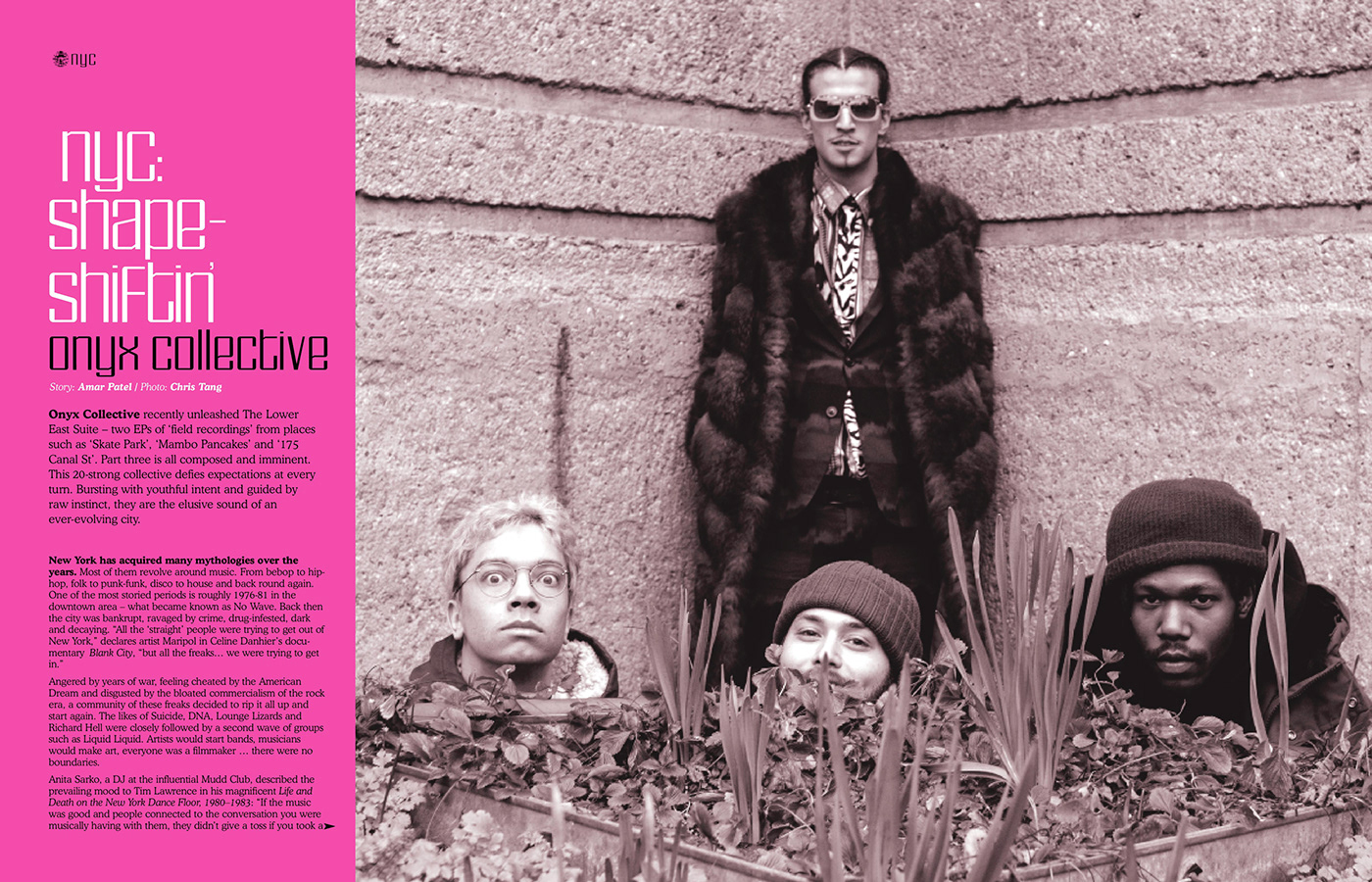

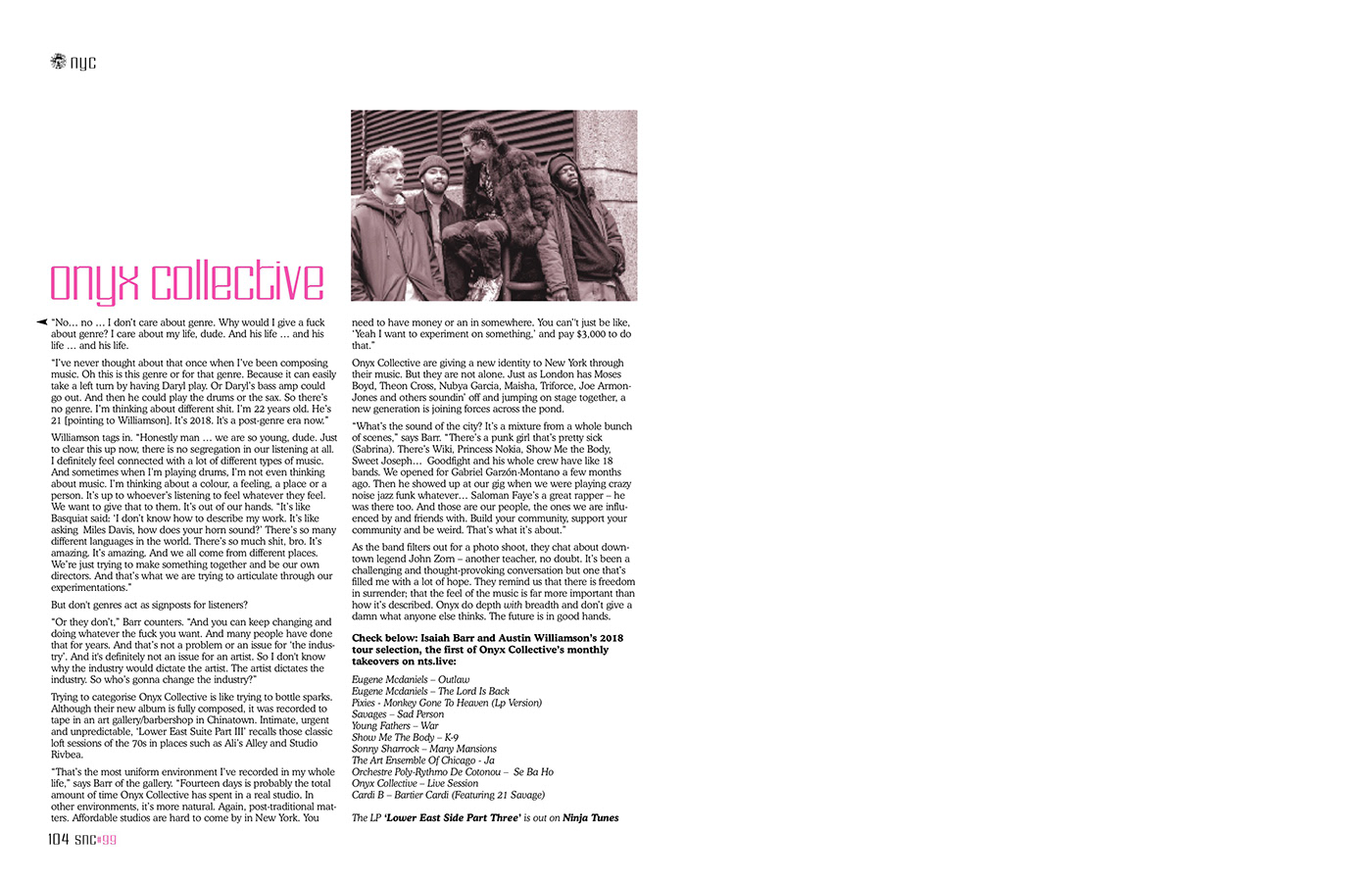
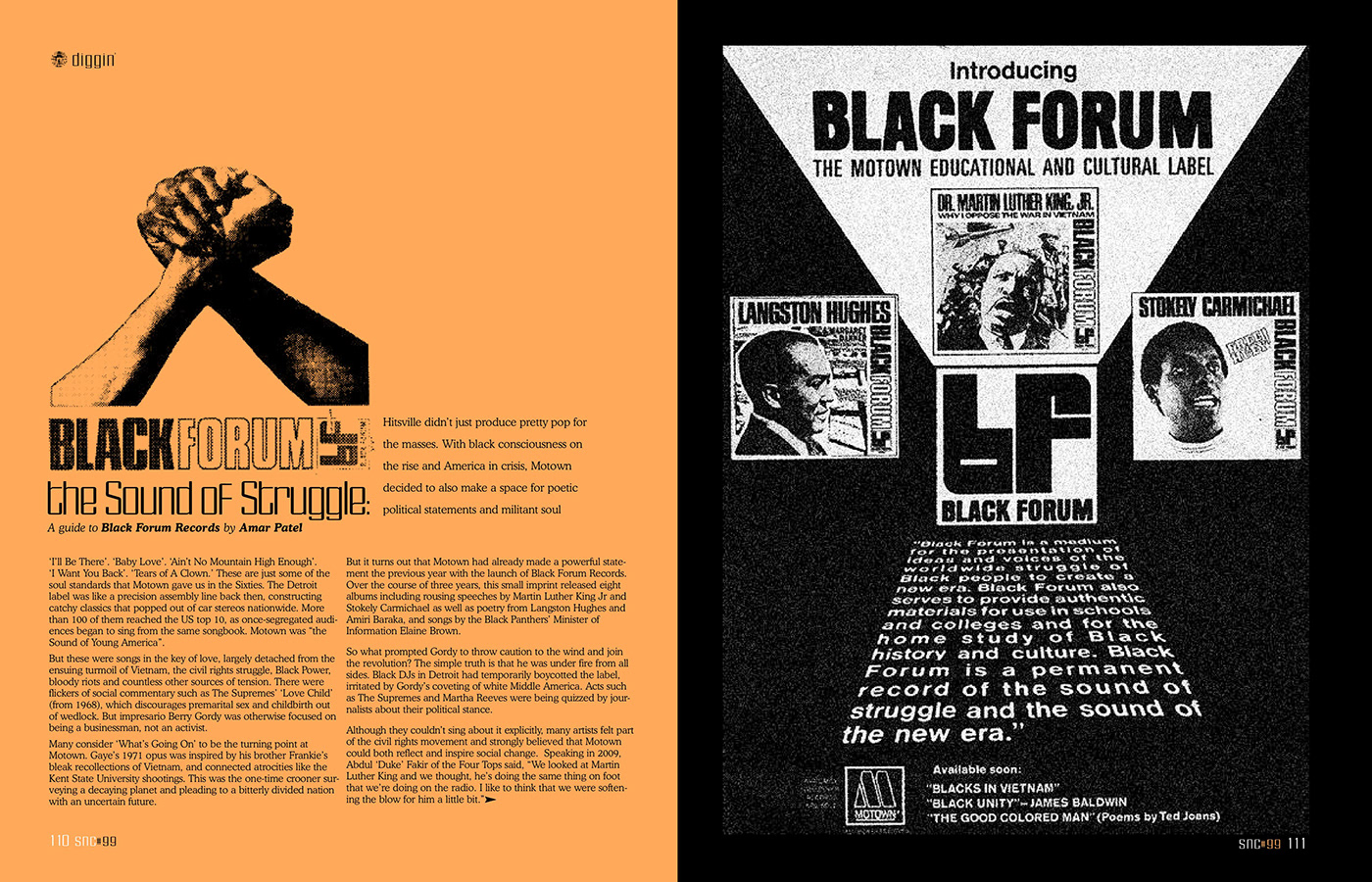
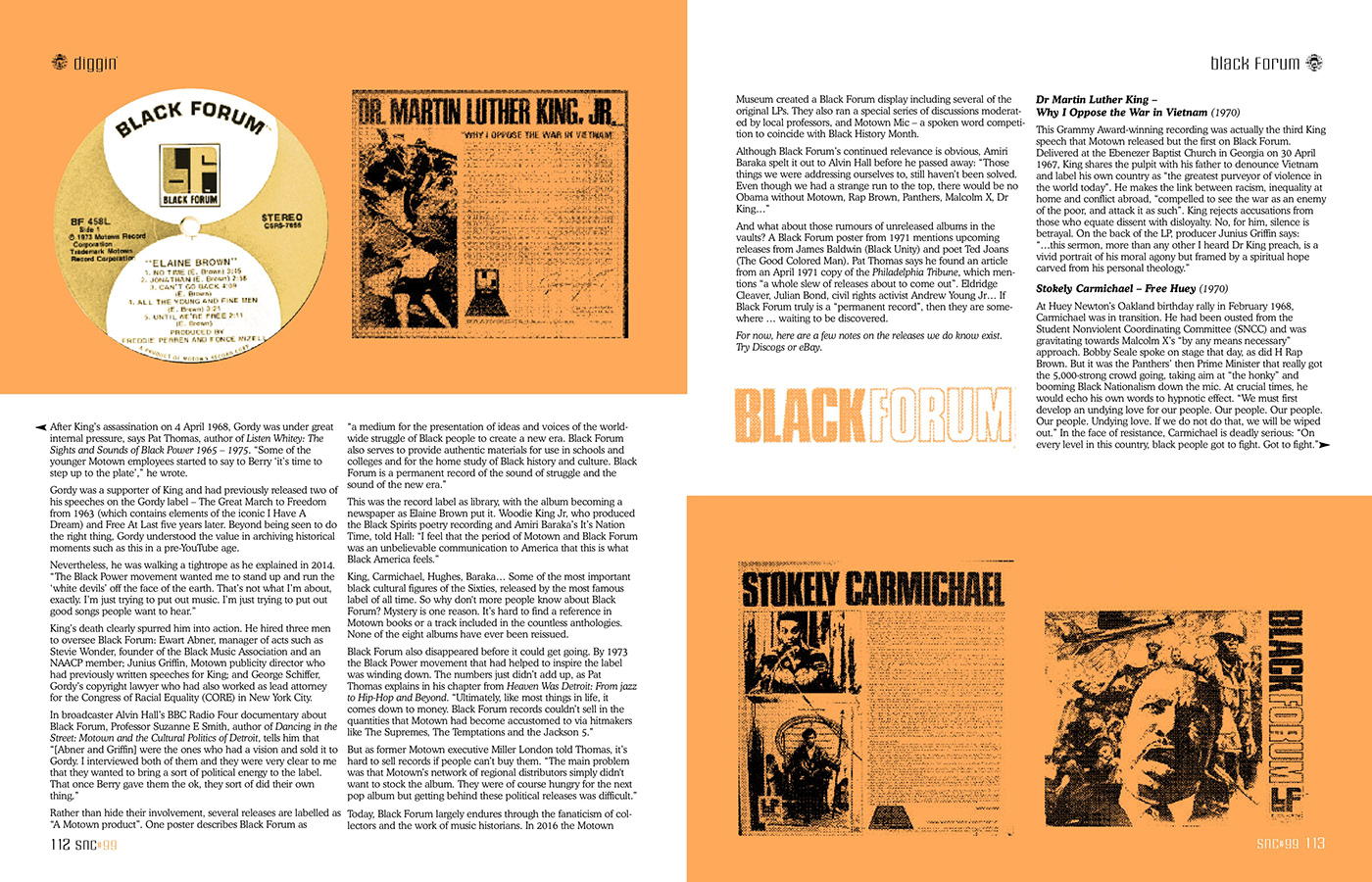
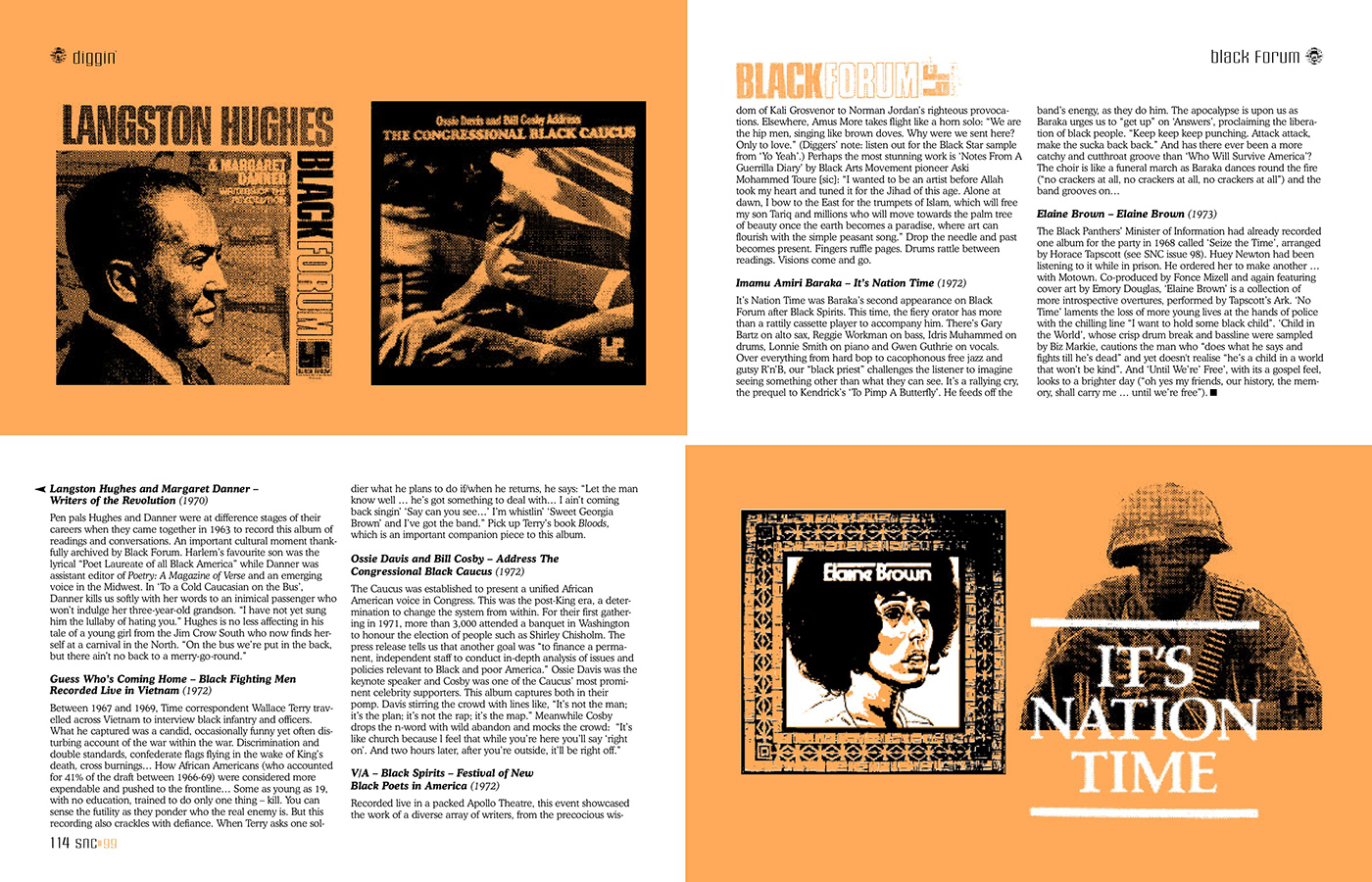
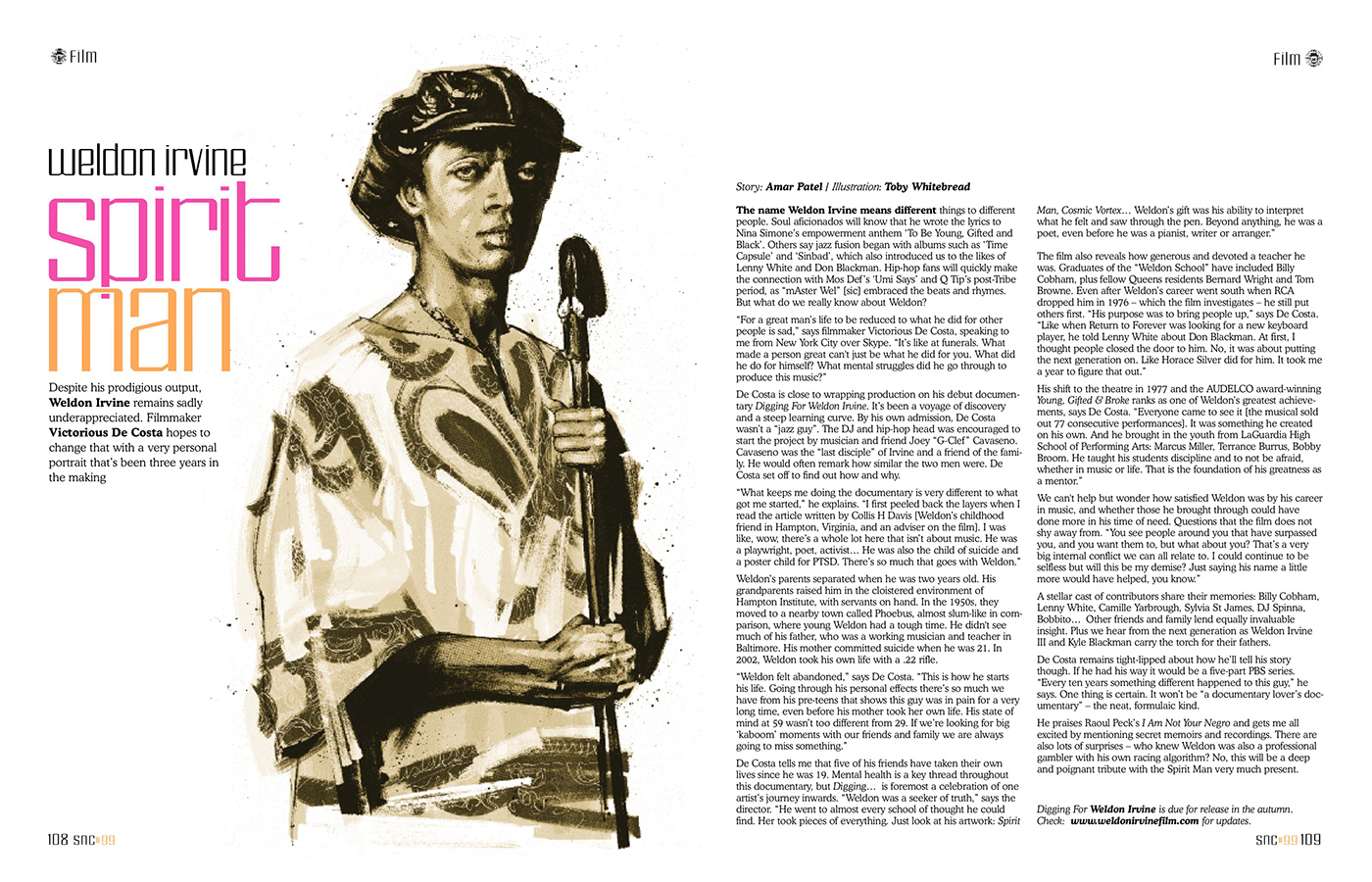

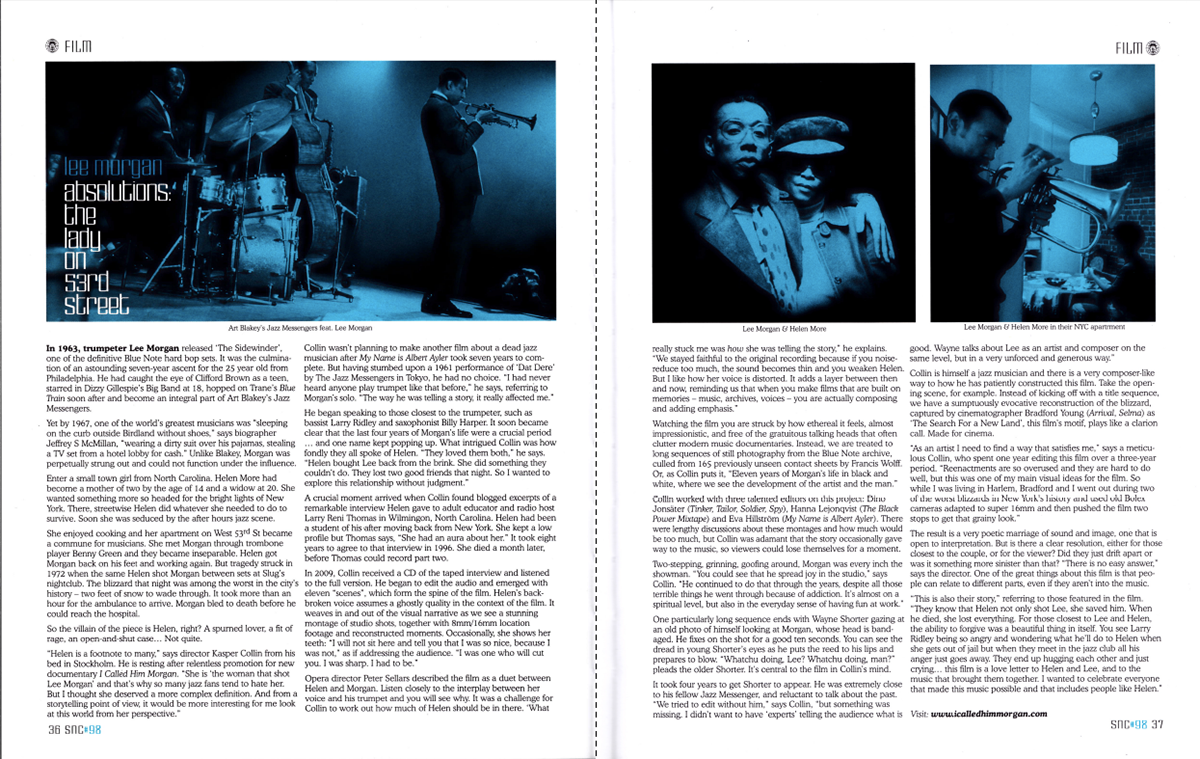
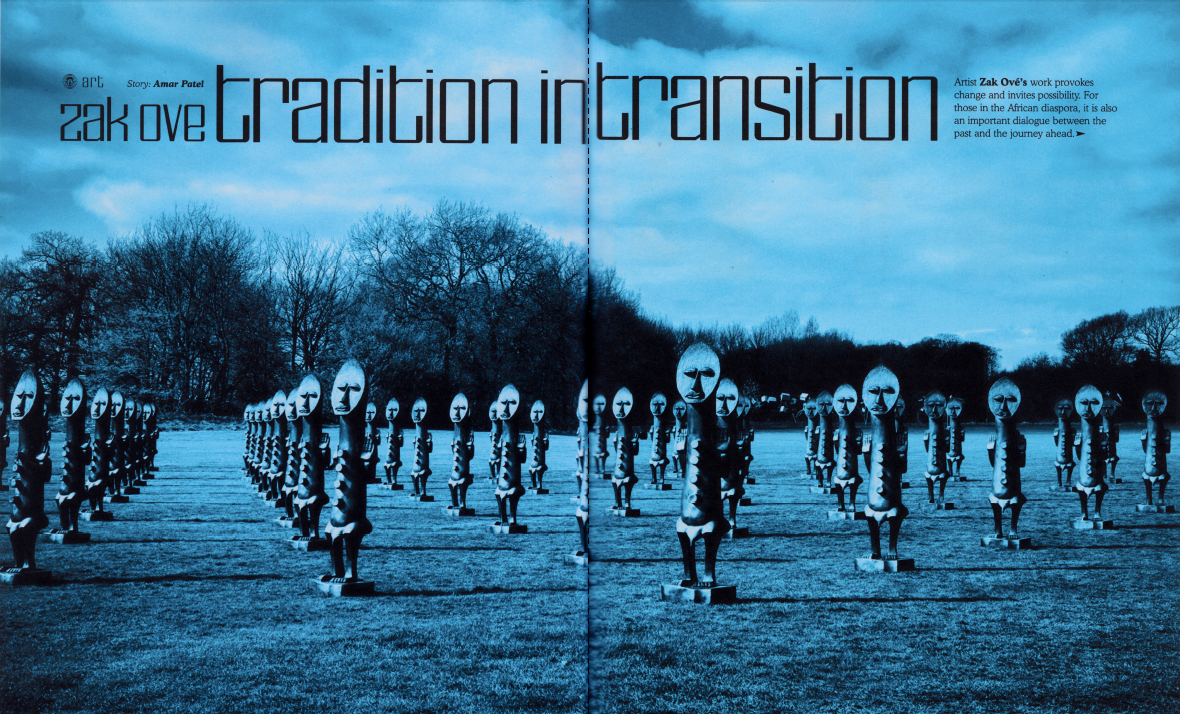
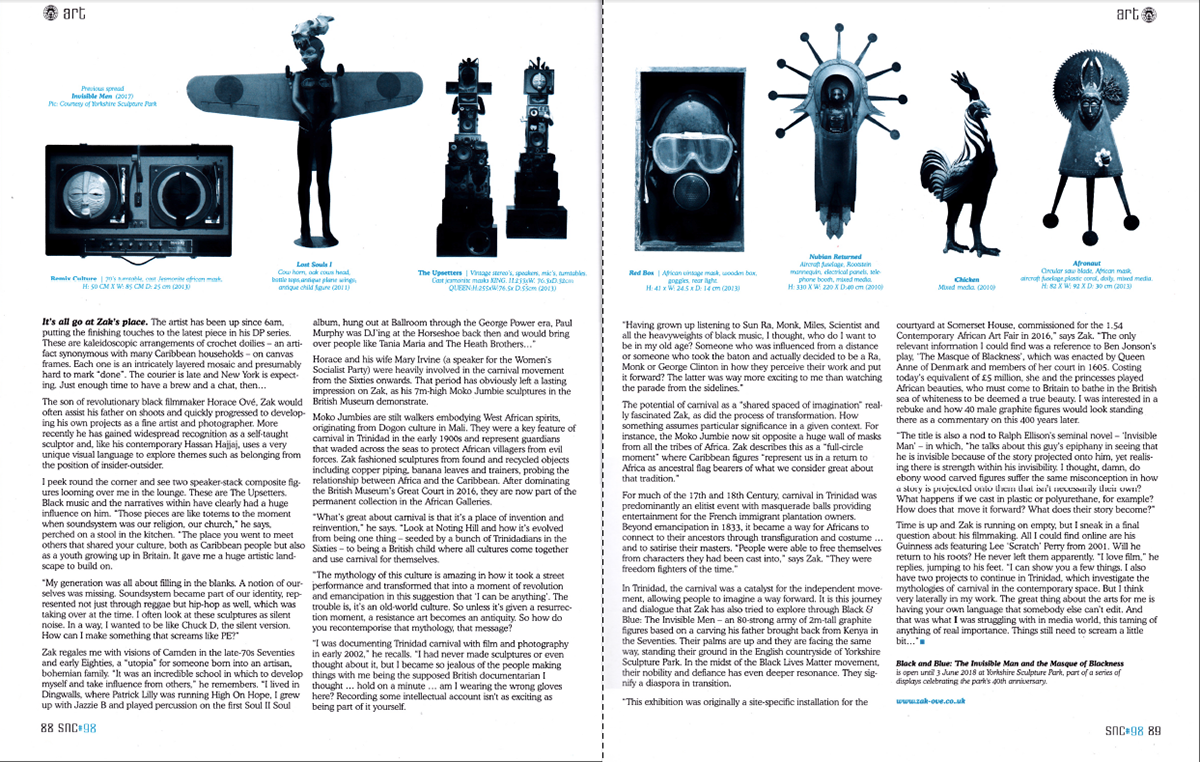

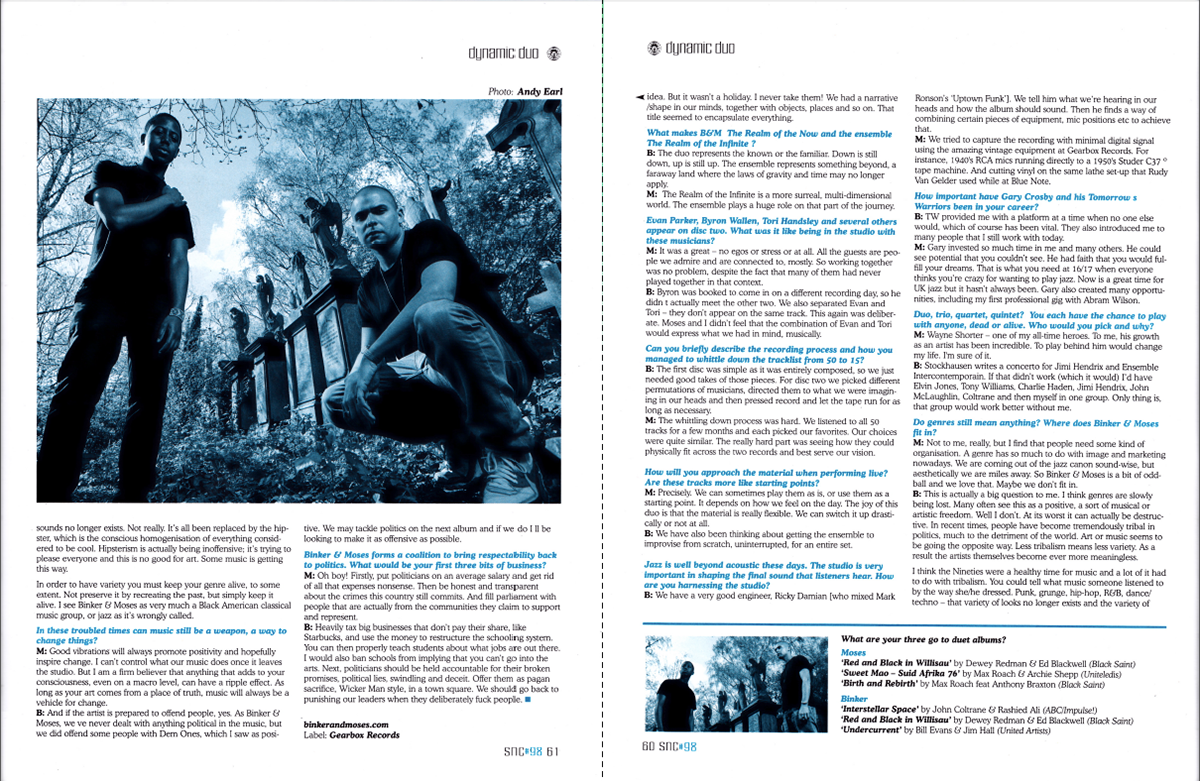

You can read this feature in full on Stones Throw's website.
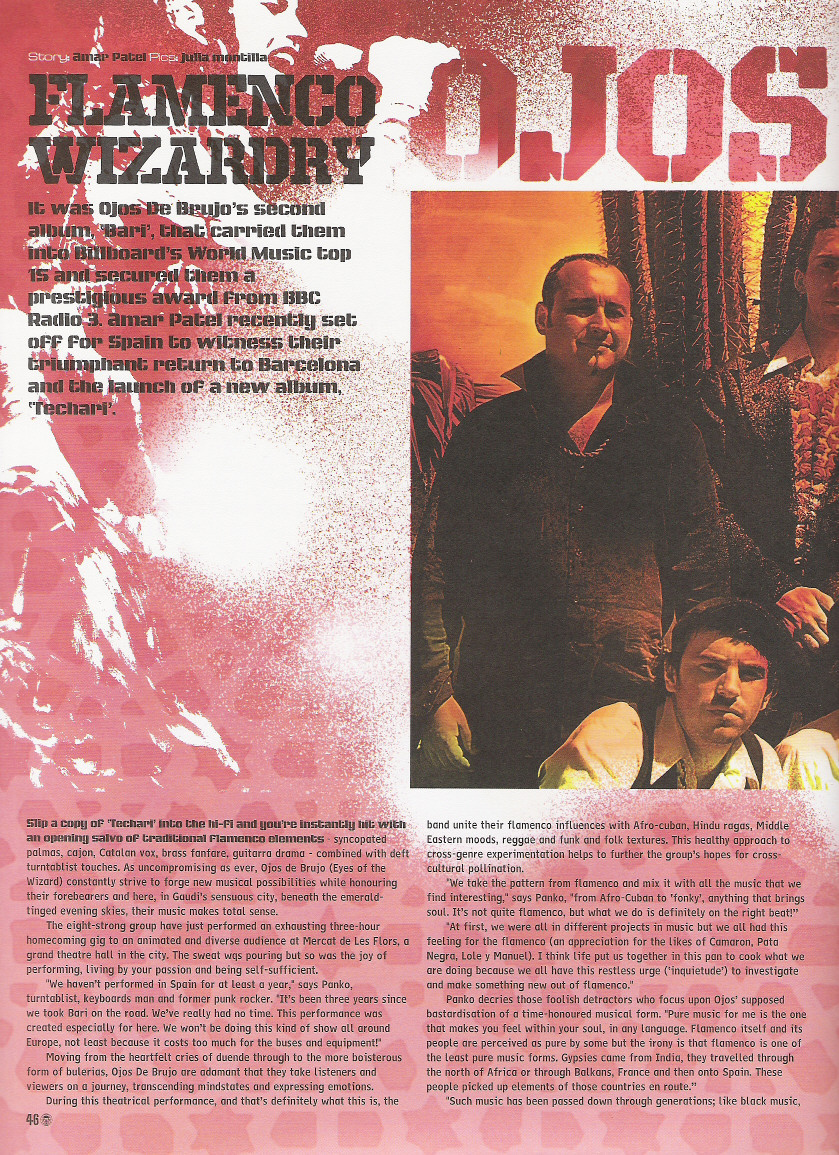


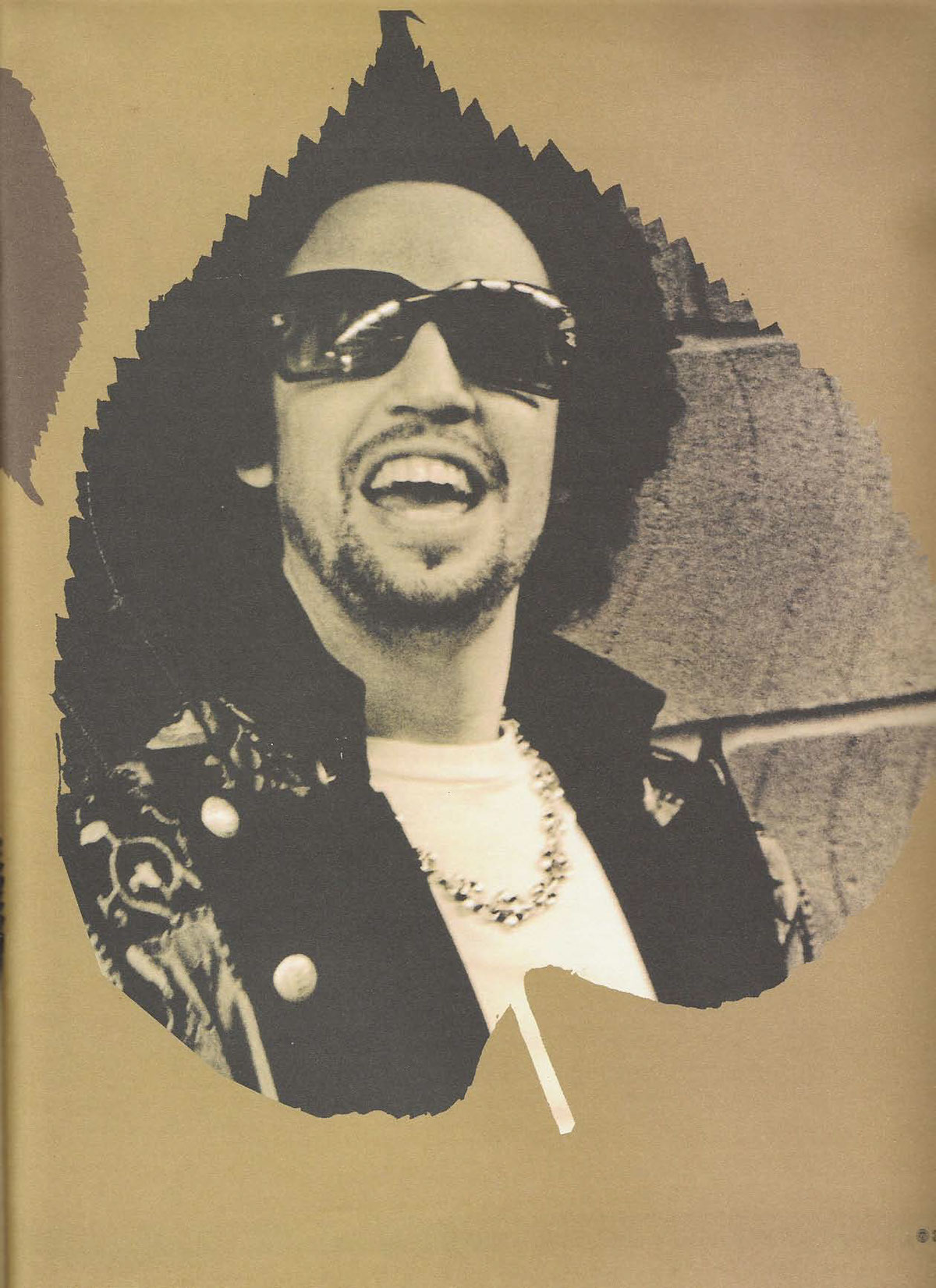
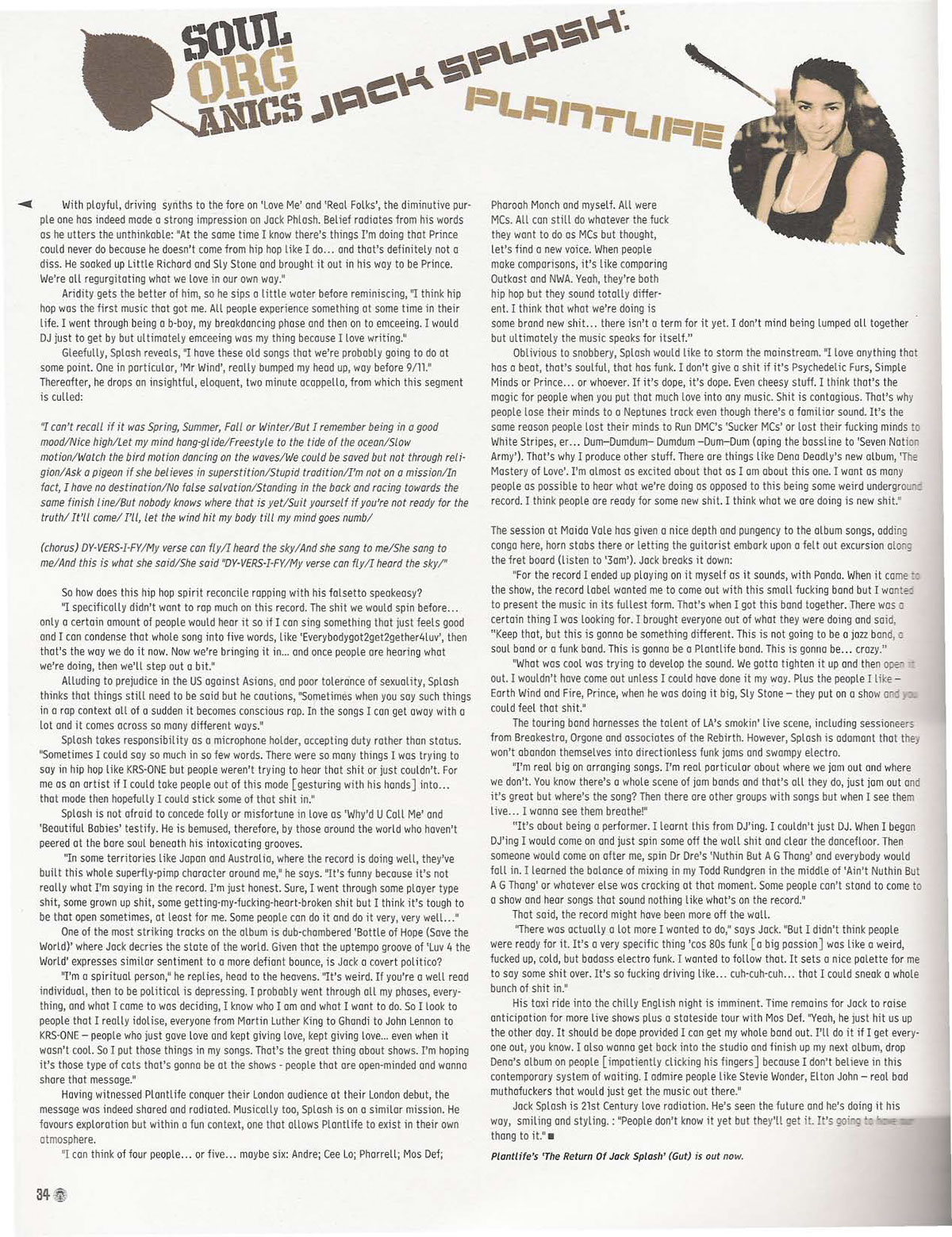

Credit: http://www.flickr.com/photos/wheelzwheeler/4417842726/
LIVE: SPACE ENGINEERING – JERRY DAMMERS' SPATIAL AKA @ THE BARBICAN, 10 MARCH 2009
http://www.jerrydammers.com/reviews/snc2009.html
"The music is different here, the vibrations are different... not like planet earth. Planet earth sound of guns, anger, frustration... there is no one to talk to on planet earth to understand... it would affect their vibrations, for the better of course... equation wise, the first thing to do is consider internal linktime as officially ended... we'll work on the other side of time... we'll bring them here through either isotope, internal linkteleportation, transmolecularzation... or better still, teleport the whole planet here through music..."
– Sun Ra, Space is the Place
Seated in suspense at the Barbican in front of Jerry Dammers’ Spatial AKA – a shimmering 14-strong collective of astral travellers – time has officially stood still. In truth, it’s a mystery. February’s cares and worries have dissipated. I’ve left this troubled planet. My half-full plastic cup of Corona has transformed into an intoxicating potion. Can Sun Ra’s eternal vibrations be that strong?
‘Cosmic Engineering’ is the second appearance in London for the Specials co-founder and Two-Tone label boss’s arkestra tribute band, following Jarvis Cocker’s Meltdown Festival two years ago. On that occasion, punters we’re fascinated and flummoxed in equal measure by the Spatial AKA’s galaxy of sound: swing band jazz, exotica, mischievous ska, hypnotic post-apocalyptic chants, improvisation and deep funk.
And tonight was no different. It’s a privilege to be in a hall that resonates with inspiring music played fearlessly and impeccably by the cream of British musicians. A space of beautiful noise. A spectacle. Remember those?
To my left, a suspended spaceship fashioned from an old motorcycle sidecar. To my right, various alien heads and complicit mannequins. Watching from afar, a back line of sarchofagi. At the front, a unit of cloaked and face-masked horn players, including Jason Yarde, Working Week’s tenor freak Larry Stabbins, Nathaniel Farcy and Denys Baptiste. Tuning in – or maybe zoning out – are Galliano’s Spry on percussion and Mercury-nominated pianist Zoe Rahman (a dainty and versatile foil for the car horn / phaser textures of Dammers), among others.
Names and appearances aside, Dammers’ arrangements of legendary compositions were superb – spiritual yet dynamic and coherent. His writing prowess and wisdom is well known but few people realise the extent of his musical travels: hip hop and jazz jams at the Wag Club; the spiritual jazz sessions at The Atlantic in Brixton; a Jazz Odyssey band appearance at Glastonbury, Russian astronaut score at the Roundhouse and so forth. From day one, Dammers has traded on instinct and ambition.
Tonight, his subtle melding of brass with rhythm, pyrotechnic textures and sci-fi FX was a marvel to behold. The lilting rendition of Sun Ra’s ‘I’ll Wait For You’ was probably the emotional apex of the evening – Francine Luce excelling with her unique blend of melancholic majesty and dread. She’d later flipped the script when impersonating jungle creatures for a cover of Martin Denny’s ‘Jungle Madness’. All in a night’s work in the AKA.
Other Sun Ra selections of note – and make no mistake, Ra is Dammers’ cosmological mentor – included ‘Nuclear War’ (reconstructed to form ‘ghost Planet’ – a fusion of poet Anthony Joseph’s prophecies with the audience’s gargled ‘Ghost Town’ melodica hook), ‘Where Pathways Meet’ and, of course, ‘Space is the Place’, which instigated an unison of chorus whistles from the hall to the men’s toilets while the band procession played on in the foyer – the House of Ra for one night. ‘True Retrospect’ and ‘Discipline’ collided – the results both disorientating and disarming. I fear I submitted myself completely at that point. Was that where the drum n’bass rhythms came in? Maybe, maybe not.
Sun Ra wasn’t the only musical maverick honoured tonight. Alice Coltrane, flickered in and out of view on the molten screen to the sound of ‘Journey To Satchidananda’ and ‘Om Nama Sivay/ Battle At Armageddon’. And Saleb Rageb’s ‘Egypt Strut’ offered one of the heaviest grooves of the night, drummer Patrick Illingworth and the bass axis of electric Ollie Bayley and upright Neil Charles excelling in particular.
Another avant-garde composer with a penchant for costumes, Moondog, fluttered into the set list with the horn-heavy ‘Bird’s Lament’, Ra devotee Cedric ‘Im’ Brooks’ ‘Satya’ sounded irie and Clement ‘Coxone’ Dodd’s spirit shook the walls with ‘Ringo Rock’. A bizarre edition to the established AKA set list was French library tune, ‘Bacchanal Chez Satan’, which showed off the intricate touch of this huge orchestra, both singularly and as a collective being – just in case we’d been overwhelmed by fierce blowing and bashing.
Upon reflection, a retro-futuristic event like this assumes greater significance, beyond your average out-there experience. As Dammers explained to Chaser’s Paul Bradshaw recently, it’s a call to arms; a call to dream.
To arrive, not to escape.
“The theme of this concert is vaguely of being in peril, of a human race heading towards self destruction. I’m trying to remember the time when there was a vision of the future because now it’s like retro-future. We need to dream of a better world.”
Ra would concur.
(Amar Patel)
(Amar Patel)
Mpho interview, published summer 2009
M-P-H-O GO
After years spent as vocalist of choice for some of the underground's hottest producers, the artist formally known as Mpho Skeef is striking out alone as Britain's next big thing
A lot’s happened since we last heard from Mpho. She’s raised a little boy, slashed her name in half, signed to a major label (Parlophone) and written an album of high-energy pop tunes and hum-along-with-me ditties that can compete with anything offered by the likes of Little Boots, VV Brown and Lady Gaga. If you’re scoffing in disbelief then listen to the Switch-produced ‘Box n’Locks’, which samples Martha & The Muffins’ guitar intro to ‘Echo Beach’ and is the first single from her debut ‘Pop Art’. Irresistible. But then Mpho’s always had a gift for songwriting.
All this hasn’t happened overnight. She’s gone from being a big fish in the secondary school productions pond to directing her own contemporary choral production at the Roundhouse. Before that she had to overcome a crisis of confidence at the Brits School, an experience she describes as “good for me because it spurred me on to work for what I wanted, push myself and deal with competition. Either that or you disappear into the background.”
More recently, she’s been a mainstay of the London underground since before the millennium, guesting on records by anyone from hip hop MC Ty (on ‘Wait A Minute’) to Bugz in the Attic’s p-funk anthem ‘Booty La La’. Simultaneously, she’s lent backing vocals to Miss Dynamite and Natasha Bedingfield and mentored a pre-Brits School Adele, long before she contemplated ‘Chasing Pavements’.
As we sit down in the quiet library of the Prince’s Foundation building in Shoreditch, where the Create Festival is in full swing downstairs (www.createlondon.org), she’s only too happy to explain the various twists and turns that have made her one of the most hyped acts in pop today, commanding four stages at Glastonbury 2009, having celebrity photographer Mark Baptiste shoot her album cover and legendary engineer Jimmy Douglas (who’s worked with Justin Timberlake, Duran Duran and Roxy Music) mix her album.
We’ve been waiting for a full album since those future-focused EPs came out in 2004 on the government-funded Documented label (featuring the likes of Dave ‘Zed Bias’ Jones, Anthony Tidd and Morgan Zarate on production). So why the delay? “Around that time I was still trying to find my sound,” she explains. “I wanted my music to be quite pop while keeping the edge, you know – the funk, soul and other influences that I’ve had throughout my life. Sometimes that can be quite a long process. The EPs got some good responses but not enough. Essentially, they were small independent releases, which means little money for marketing and promo.
“Off the back of that I signed to Pias just before they merged with Wall of Sound. That all took a while and I even wasn’t sure if the new label manager was going to like me. I thought I was going to get dropped. Then one day I was sat in a room talking quite passionately about what I wanted to do. I was getting pretty frustrated by the situation. The MD [Mark Jones] happened to be there, just hanging out. He overheard the conversation and said he got where I was coming from.
“So we started working on a new album based on a few pieces of music that had come about at the time. It just built from there. I went through changes personally and, of course, the industry context in which album was being made also changed during that time. The record evolved from there. During that time, it was good to take a break and listen to music from a different perspective.”
And the saga continued. “When Mark heard the finished album he said, ‘This is a pop record.’ I said, ‘I know.’ ‘But we haven’t got pop money,’ he replied. ‘But I know a man who has.’ Then Parlophone came to the rescue, loved the record and didn’t want to change a thing.”
‘Pop Art’ is built for modern times. It panders to the current wave on electro pop sung by girls with attitude. The difference with Mpho is that her lyrics, although clever and definitely ‘on the hook’, are imbued with a rare honesty and individuality. Look beyond the package, or the medium, and Mpho’s doing more than proselytising to the feminists. She’s having fun and isn’t letting her past to hold her back. “My album is a lot more poppy than the Documented material,” she says, “but I hope that [my older fans] play it to death and don’t just dismiss it as a pop record.
“I was slightly apprehensive about leaving behind a lot of guys I consider to be my people [Bugz, Dave Jones and Ty, for instance] but one of the reasons I thought it was the right decision was that, while there is certainly a lot of narrow-mindedness within the mainstream industry, there is also a lot of it within the alternative more niche scene. People cling to what they think is ‘real’. I just thought, you know what, this is what’s real to me so this is what I’m going to do. And with pride.”
Listening to the album you can immediately understand what Mpho means when she says she’s taken a “leap of faith”. Think back to those deep house and broken beat tracks such as ‘What Hearts Share’ (produced by Dave Jones) or the more recent club track ‘Classic Cliché’ with the Elektrons and they’re a world away from the unabashed and pithy tunes of ‘Pop Art’. It’s her effort to communicate with the masses.
“Those early collaborations were definitely important to my development otherwise I wouldn’t have done them,” she explains. “I’m quite choosy about who I work with. In particular, I love Dave. People like him bring special things out of me that other producers can’t. The negative aspect of that period was that it began to tie me down and pigeonhole me as one type of artist. I never wanted to be that. So I made a clean break. I stopped going to Co-op [the legendary club session at Plastic People in Shoreditch] and stayed at home to write my music. I didn’t want to be jumping on everybody else’s thing. Besides, life is cyclical and you can always come back to that stuff.
The success of her album depends as much on the listener as it does the catchiness of her material. “On ‘Pop Art’ there’s music for everybody,” she argues. “It just depends on whether you’re willing to listen. That goes for you’re coming from a mainstream or alternative standpoint. If people ask what to expect from this album, I say… don’t expect anything. Just listen. And be open.”
Apart from a deceptively agile voice and her effortless melody, Mpho uses two main weapons on her debut album. One is ENERGY. A prerequisite if you’re going to appeal to the kids and the gym-going, foot-tapping big kids tuning into daytime radio. But wait. She’s a mother of two, who admits to being quite lackadaisical when it comes to hearing ‘hot new thing’ or mash up doing the rounds. Was it difficult to bring a buzz or raw energy to the record?
“Not at all,” she counters. “It’s what I’ve wanted to do for a while. That’s the thing! This record is a direct result of how I was feeling at the time [of the last EPs]. I felt like there wasn’t enough energy in what I was doing. I wanted to run around on stage and just let off but I couldn’t do it with the old music; it was too mature and subdued. Things happen when the time’s right. I firmly believe that. I don’t think I could have made this record five or ten years ago. I almost had to do things back to front and mature first, in order to handle that energy.”
The second is her knack for SONGWRITING, which far exceeds the ability to harmonise a killer hook. On ‘Pop Art’ she covers so many facets of everyday life, from striving for acceptance as an individual (‘Box n’Locks’), to controlling your own destiny (‘All Change’), dealing with a relationship wrecked by drug abuse ('S.P.A.C.E. Man') and loving the simple joys of going out on a Friday night and dealing with the fallout on the next day (‘Morning After’ – “reeling in the glory of the night before”). “Pop songwriting is a different art [to writing with Bugz or more alternative acts]. There are some limitations but then there are also freedoms. I have talked about a few issues on this record and I’m proud to say that I’ve done it in such a way that people will be able to listen and relate. And take away something from the song.”
Rather than feeling that she’s had to dumb down to climb the charts, Mpho thinks that last few years have been an important communication lesson her – in both music and life. “I found it liberating to write ‘Pop Art’,” she explains. “I was constantly being encouraged by people to think about the hook while trying to say what I wanted to say in a short space of time; and at the point when people are actually going to be listening. The challenge is to be succinct and to make a clear statement. If you can do that and still maintain some depth and breadth in your subject matter then that’s a great achievement.”
A third plus for Mpho is her deep musical ancestry, although it has been overplayed on occasion. She was born and raised in South Africa to a very musical family (Mpho is a popular Sesotho name meaning “gift”), not least her father, Sipho “Hotstix" Mabuse. He was a local legend who recorded and produced for, among others, Miriam Makeba, Hugh Masekela and Ray Phiri. He was also responsible for the single ‘Burn Out’ in the early 1980s, which sold over 500,000 copies, and the giant mbaqanga hit of the late 1980s, ‘Jive Soweto’.
Contrary to muso speculation Mabuse had almost no influence on Mpho’s music, as she’d left South Africa with only vivid memories of the Motherland by the age of four, before settling in Brixton, south London, with her mother and stepfather Eugene Skeef. If anyone guided her it was Skeef, a respected educator and composer from the same South African generation as pianist Bheki Mseleku. He helped to mould Mpho the artist, by instilling a good work ethic from the get-go and encouraging her to practice guitar regularly. Not that she always listened!
For obvious reasons therefore, she’s delighted that new album will be released in South Africa at the same time as the UK. Mpho still has a deep fondness for her birthplace. “It’s still one of my homes,” she insists. “I’m a bit of a nomad. I went back last year… and the year before. It will be really exciting for me to promo the new album there. It’s really encouraging for me to be getting these opportunities now; to be able to promote in both countries instead of having to wait to see how ‘Pop Art’ does in the UK.”
So everything is in place for Mpho to take the world by storm. And let’s hope she does. She’s a shining example of one individual applying their talents against the odds. The NSPCC and Urban Development ambassador (www.urbandevelopment.co.uk) is ready and willing to shoulder the responsibility of being a role model. “A lot of the ailments in our society come from people feeling under pressure to conform and wrestling with the negative emotions that build up. Young people are struggling to find themselves. That’s why we have projects like Urban Development to give them an outlet to express themselves – to find out who they are.”
Being a pop star usually involves relinquishing some freedom, whether it’s artistic control or image. Not so with Mpho. “I love getting dressed up, you know. The full package. But this is who I am, the colour of hair, how I’m standing… everything. Tough if you don’t like it. Thankfully, I haven’t had to make any compromises with this project. I’m so happy. Parlophone love the album just the way it is. They don’t mind my size or my hair colour. They only want to be there to give me the resources to facilitate my music and what I’m about as an artist.”
As conversation drifts to the future, you can sense the impatience. Mpho is itching to get on stage, fill big venues and conquer the US. I gauge her ambition against the likes of Roisin Murphy, one of the British Isles’ most diverse artists, who recently worked with Bugz’s Seiji on her latest album. Mpho’s full of admiration but thinks she can go one better. “I love Roisin.” she says. “I love the music she makes, her styling and I think she’s a sick performer. She inspires me in what she’s doing next but I don’t think she’s got a major accessibility. She’s rather an acquired taste. That said, I definitely want to do three nights at Brixton Academy and perform in massive stadiums. I’m not going to pretend that I’m happy to do the cool thing and play a week at the Jazz Café… because I don’t!
“Live is my thing. That’s when I come alive. Right now, I’ve taken a break from writing and I’m focused on hitting the road; taking it to the next level. I love the theatrical part of performing and I definitely want to add more elements to a show. Huge productions are so exciting. I saw Beyonce recently in Birmingham and loved it. If you can do that and say something at the same time, then that’s it.
We may have to wait a while before she takes over the Billboard Top 100 though. “I haven’t started the US push yet,” she reveals. “We may take a different approach with the singles in order to show a different side to me. After all, music is so segregated out there and there are many radio stations. But that’s fine because ‘Pop Art’ is a multifaceted record. It’s me in my entirety. I’m confident that when I get out to LA and NYC I’ll make it happen.” (Amar Patel)
M-P-H-O GO
After years spent as vocalist of choice for some of the underground's hottest producers, the artist formally known as Mpho Skeef is striking out alone as Britain's next big thing
A lot’s happened since we last heard from Mpho. She’s raised a little boy, slashed her name in half, signed to a major label (Parlophone) and written an album of high-energy pop tunes and hum-along-with-me ditties that can compete with anything offered by the likes of Little Boots, VV Brown and Lady Gaga. If you’re scoffing in disbelief then listen to the Switch-produced ‘Box n’Locks’, which samples Martha & The Muffins’ guitar intro to ‘Echo Beach’ and is the first single from her debut ‘Pop Art’. Irresistible. But then Mpho’s always had a gift for songwriting.
All this hasn’t happened overnight. She’s gone from being a big fish in the secondary school productions pond to directing her own contemporary choral production at the Roundhouse. Before that she had to overcome a crisis of confidence at the Brits School, an experience she describes as “good for me because it spurred me on to work for what I wanted, push myself and deal with competition. Either that or you disappear into the background.”
More recently, she’s been a mainstay of the London underground since before the millennium, guesting on records by anyone from hip hop MC Ty (on ‘Wait A Minute’) to Bugz in the Attic’s p-funk anthem ‘Booty La La’. Simultaneously, she’s lent backing vocals to Miss Dynamite and Natasha Bedingfield and mentored a pre-Brits School Adele, long before she contemplated ‘Chasing Pavements’.
As we sit down in the quiet library of the Prince’s Foundation building in Shoreditch, where the Create Festival is in full swing downstairs (www.createlondon.org), she’s only too happy to explain the various twists and turns that have made her one of the most hyped acts in pop today, commanding four stages at Glastonbury 2009, having celebrity photographer Mark Baptiste shoot her album cover and legendary engineer Jimmy Douglas (who’s worked with Justin Timberlake, Duran Duran and Roxy Music) mix her album.
We’ve been waiting for a full album since those future-focused EPs came out in 2004 on the government-funded Documented label (featuring the likes of Dave ‘Zed Bias’ Jones, Anthony Tidd and Morgan Zarate on production). So why the delay? “Around that time I was still trying to find my sound,” she explains. “I wanted my music to be quite pop while keeping the edge, you know – the funk, soul and other influences that I’ve had throughout my life. Sometimes that can be quite a long process. The EPs got some good responses but not enough. Essentially, they were small independent releases, which means little money for marketing and promo.
“Off the back of that I signed to Pias just before they merged with Wall of Sound. That all took a while and I even wasn’t sure if the new label manager was going to like me. I thought I was going to get dropped. Then one day I was sat in a room talking quite passionately about what I wanted to do. I was getting pretty frustrated by the situation. The MD [Mark Jones] happened to be there, just hanging out. He overheard the conversation and said he got where I was coming from.
“So we started working on a new album based on a few pieces of music that had come about at the time. It just built from there. I went through changes personally and, of course, the industry context in which album was being made also changed during that time. The record evolved from there. During that time, it was good to take a break and listen to music from a different perspective.”
And the saga continued. “When Mark heard the finished album he said, ‘This is a pop record.’ I said, ‘I know.’ ‘But we haven’t got pop money,’ he replied. ‘But I know a man who has.’ Then Parlophone came to the rescue, loved the record and didn’t want to change a thing.”
‘Pop Art’ is built for modern times. It panders to the current wave on electro pop sung by girls with attitude. The difference with Mpho is that her lyrics, although clever and definitely ‘on the hook’, are imbued with a rare honesty and individuality. Look beyond the package, or the medium, and Mpho’s doing more than proselytising to the feminists. She’s having fun and isn’t letting her past to hold her back. “My album is a lot more poppy than the Documented material,” she says, “but I hope that [my older fans] play it to death and don’t just dismiss it as a pop record.
“I was slightly apprehensive about leaving behind a lot of guys I consider to be my people [Bugz, Dave Jones and Ty, for instance] but one of the reasons I thought it was the right decision was that, while there is certainly a lot of narrow-mindedness within the mainstream industry, there is also a lot of it within the alternative more niche scene. People cling to what they think is ‘real’. I just thought, you know what, this is what’s real to me so this is what I’m going to do. And with pride.”
Listening to the album you can immediately understand what Mpho means when she says she’s taken a “leap of faith”. Think back to those deep house and broken beat tracks such as ‘What Hearts Share’ (produced by Dave Jones) or the more recent club track ‘Classic Cliché’ with the Elektrons and they’re a world away from the unabashed and pithy tunes of ‘Pop Art’. It’s her effort to communicate with the masses.
“Those early collaborations were definitely important to my development otherwise I wouldn’t have done them,” she explains. “I’m quite choosy about who I work with. In particular, I love Dave. People like him bring special things out of me that other producers can’t. The negative aspect of that period was that it began to tie me down and pigeonhole me as one type of artist. I never wanted to be that. So I made a clean break. I stopped going to Co-op [the legendary club session at Plastic People in Shoreditch] and stayed at home to write my music. I didn’t want to be jumping on everybody else’s thing. Besides, life is cyclical and you can always come back to that stuff.
The success of her album depends as much on the listener as it does the catchiness of her material. “On ‘Pop Art’ there’s music for everybody,” she argues. “It just depends on whether you’re willing to listen. That goes for you’re coming from a mainstream or alternative standpoint. If people ask what to expect from this album, I say… don’t expect anything. Just listen. And be open.”
Apart from a deceptively agile voice and her effortless melody, Mpho uses two main weapons on her debut album. One is ENERGY. A prerequisite if you’re going to appeal to the kids and the gym-going, foot-tapping big kids tuning into daytime radio. But wait. She’s a mother of two, who admits to being quite lackadaisical when it comes to hearing ‘hot new thing’ or mash up doing the rounds. Was it difficult to bring a buzz or raw energy to the record?
“Not at all,” she counters. “It’s what I’ve wanted to do for a while. That’s the thing! This record is a direct result of how I was feeling at the time [of the last EPs]. I felt like there wasn’t enough energy in what I was doing. I wanted to run around on stage and just let off but I couldn’t do it with the old music; it was too mature and subdued. Things happen when the time’s right. I firmly believe that. I don’t think I could have made this record five or ten years ago. I almost had to do things back to front and mature first, in order to handle that energy.”
The second is her knack for SONGWRITING, which far exceeds the ability to harmonise a killer hook. On ‘Pop Art’ she covers so many facets of everyday life, from striving for acceptance as an individual (‘Box n’Locks’), to controlling your own destiny (‘All Change’), dealing with a relationship wrecked by drug abuse ('S.P.A.C.E. Man') and loving the simple joys of going out on a Friday night and dealing with the fallout on the next day (‘Morning After’ – “reeling in the glory of the night before”). “Pop songwriting is a different art [to writing with Bugz or more alternative acts]. There are some limitations but then there are also freedoms. I have talked about a few issues on this record and I’m proud to say that I’ve done it in such a way that people will be able to listen and relate. And take away something from the song.”
Rather than feeling that she’s had to dumb down to climb the charts, Mpho thinks that last few years have been an important communication lesson her – in both music and life. “I found it liberating to write ‘Pop Art’,” she explains. “I was constantly being encouraged by people to think about the hook while trying to say what I wanted to say in a short space of time; and at the point when people are actually going to be listening. The challenge is to be succinct and to make a clear statement. If you can do that and still maintain some depth and breadth in your subject matter then that’s a great achievement.”
A third plus for Mpho is her deep musical ancestry, although it has been overplayed on occasion. She was born and raised in South Africa to a very musical family (Mpho is a popular Sesotho name meaning “gift”), not least her father, Sipho “Hotstix" Mabuse. He was a local legend who recorded and produced for, among others, Miriam Makeba, Hugh Masekela and Ray Phiri. He was also responsible for the single ‘Burn Out’ in the early 1980s, which sold over 500,000 copies, and the giant mbaqanga hit of the late 1980s, ‘Jive Soweto’.
Contrary to muso speculation Mabuse had almost no influence on Mpho’s music, as she’d left South Africa with only vivid memories of the Motherland by the age of four, before settling in Brixton, south London, with her mother and stepfather Eugene Skeef. If anyone guided her it was Skeef, a respected educator and composer from the same South African generation as pianist Bheki Mseleku. He helped to mould Mpho the artist, by instilling a good work ethic from the get-go and encouraging her to practice guitar regularly. Not that she always listened!
For obvious reasons therefore, she’s delighted that new album will be released in South Africa at the same time as the UK. Mpho still has a deep fondness for her birthplace. “It’s still one of my homes,” she insists. “I’m a bit of a nomad. I went back last year… and the year before. It will be really exciting for me to promo the new album there. It’s really encouraging for me to be getting these opportunities now; to be able to promote in both countries instead of having to wait to see how ‘Pop Art’ does in the UK.”
So everything is in place for Mpho to take the world by storm. And let’s hope she does. She’s a shining example of one individual applying their talents against the odds. The NSPCC and Urban Development ambassador (www.urbandevelopment.co.uk) is ready and willing to shoulder the responsibility of being a role model. “A lot of the ailments in our society come from people feeling under pressure to conform and wrestling with the negative emotions that build up. Young people are struggling to find themselves. That’s why we have projects like Urban Development to give them an outlet to express themselves – to find out who they are.”
Being a pop star usually involves relinquishing some freedom, whether it’s artistic control or image. Not so with Mpho. “I love getting dressed up, you know. The full package. But this is who I am, the colour of hair, how I’m standing… everything. Tough if you don’t like it. Thankfully, I haven’t had to make any compromises with this project. I’m so happy. Parlophone love the album just the way it is. They don’t mind my size or my hair colour. They only want to be there to give me the resources to facilitate my music and what I’m about as an artist.”
As conversation drifts to the future, you can sense the impatience. Mpho is itching to get on stage, fill big venues and conquer the US. I gauge her ambition against the likes of Roisin Murphy, one of the British Isles’ most diverse artists, who recently worked with Bugz’s Seiji on her latest album. Mpho’s full of admiration but thinks she can go one better. “I love Roisin.” she says. “I love the music she makes, her styling and I think she’s a sick performer. She inspires me in what she’s doing next but I don’t think she’s got a major accessibility. She’s rather an acquired taste. That said, I definitely want to do three nights at Brixton Academy and perform in massive stadiums. I’m not going to pretend that I’m happy to do the cool thing and play a week at the Jazz Café… because I don’t!
“Live is my thing. That’s when I come alive. Right now, I’ve taken a break from writing and I’m focused on hitting the road; taking it to the next level. I love the theatrical part of performing and I definitely want to add more elements to a show. Huge productions are so exciting. I saw Beyonce recently in Birmingham and loved it. If you can do that and say something at the same time, then that’s it.
We may have to wait a while before she takes over the Billboard Top 100 though. “I haven’t started the US push yet,” she reveals. “We may take a different approach with the singles in order to show a different side to me. After all, music is so segregated out there and there are many radio stations. But that’s fine because ‘Pop Art’ is a multifaceted record. It’s me in my entirety. I’m confident that when I get out to LA and NYC I’ll make it happen.” (Amar Patel)
Matthew Halsall interview, published spring 2009
ABOUT TO BLOW
It’s far too easy to be restless in 2009. To chase your own tail. The modern world celebrates speed, status, glamour and instant gratification. Buy happiness: sell yourself. Follow everybody: know no one. smart phones: distant folks. Ironically, true contentment eludes most of us. In short, we're missing the point.
So where does music come into it? Well, music is the facilitator. It sets the tone. It either accelerates our lives on the edge or it stops us in our tracks and opens our eyes and ears to the moment. The latter usually requires a lifetime’s worth of maturity to master. Not so with 26-year-old trumpeter and bandleader Matthew Halsall.
The Manchester lad cuts a modest and gentile figure, dressed casually in prescription T-shirt, well-worn baseball cap and squinting with sincerity. Over the last year he was developed a loyal following in the UK jazz scene after releasing two beautiful, breezy albums, ‘Sending My Love’ and ‘Colour Yes’, which have been championed by the likes of Gilles Peterson, who invited Halsall to perform with the Tippetts and Nostalgia 77 at his recent Ronnie Scott’s 50th birthday weekend. His striking melodies, lyrical honesty and down-to-earth nature have smitten so many listeners. A purity of tone that recalls ‘A Kind Of Blue’-era Miles Davis and Chet Baker, infused with the transcendental calm of Don Cherry and Alice Coltrane, all meticulously ‘choreographed’ with a Swinscoe hand.
Davis famously presaged the age of modal jazz, promising that, “There will be fewer chords but infinite possibilities as to what to do with them.” In other words, simplicity, space, lyricism and a new harmonic language. Halsall is continuing that tradition.
Our in-depth conversation on a mild Friday winter in Primrose Hill is like the proverbial rabbit hole into Halsall’s life. He’s lived a lot in a short space of time, it seems. We’re sitting comfortably so his story begins. “My granddad was a piano player. He had an organ in his house and we had a piano in ours. He’d come round and play in this Fats Waller style. You know, cheeky organ stuff. But my first proper exposure to jazz was big band at six years old – the Wigan Youth Jazz Orchestra. They played covers of ‘Milestones’, ‘A Night in Tunisia’, Duke Ellington… It was such an explosive and amazing thing to witness as a kid.
“The trumpet players were having a laugh throughout the gig. I thought that would be a fun thing to do. So I picked up the trumpet at six and by 13 I was in that very same band, touring the world. Today, 50 per cent of the guys in that band are some of the biggest session players in the country. Guys like Alistair White [1997 Young Jazz Musician of the Year] who’s since become the main man for trombone playing.”
Such a full-bodied immersion into high-calibre musicianship would have phased most young players. But Halsall is blessed with natural composure and optimism. “I really enjoyed that experience,” he says. “Most of the other band members were six years older than me but I didn’t feel much pressure. You don’t think about it at that age. You just soak it up. It was the same when I toured with cockney legend Eric Delaney. Soon after, I started doing my own bands.”
Living in Manchester provided an instant springboard to countless sounds and scenes for the young Halsall. He began his obsession with record collecting, tried his hand at sound engineering, filmmaking, DJing, started sneaking into sessions such as Mr Scruff’s night at Planet K and began working on promotions for Warp records in the north-west. A heady but fallow period. “I sat making loads of music on my own for three messy years, enjoying it but not really going anywhere,” he recalls. “I was trying to make music that would fit into the hip sound – Ninja Tune, Warp, club breakbeats – but I didn’t feel cool with it; probably because I didn’t know what my sound was at that age.
“At the same time, guys like Scruff and Gilles Peterson were introducing me to all kinds of music. I started to realise what I did and didn’t like. I mean, Scruff played Fela, Pharoah, acid jazz… I just thought, ‘what’s all this? This isn’t the jazz I’d been playing!’”
This combination of ‘music education’ and creative cluelessness prompted Halsall to go back to the beginning and search for a sound that could be both modern and enduring. “I sat at that piano that has been in my parents’ house for 20 years [it’s now in his house] and tried to make something stripped down and honest. Everything from my first two albums was written on that piano with just bass, chords and melody. I started to put together a band, looking for musicians who could capture my sound but play with some freedom. I had Cinematic Orchestra’s Luke Flowers on drums, John Ellis on piano, Jon Thorne (who appears on Halsall’s ‘Sending My Love’) on double bass, the brilliant flute player Roger Wickham… but they didn’t gel. So I kept searching until I found a band I was comfortable with.”
In a very short space of time, Halsall has made the transition from player to bandleader – guided by instinct as much as experience. “I learned a lot during that time. I now feel that I can work with most musicians. It’s about balance and keeping everyone happy in the band. I’m always thinking about dynamics, levels, whose solo is next…
“When I’m writing I listen to all types of music so I can hear the different kinds of instruments. Then I’ll sit at the piano. Melodies sound quite high with certain instruments like the trumpet. So that’s why soprano sax is a better option [listen to Nat Birchall on ‘Colour Yes’]. That’s also why I picked flute to float the melodies on top of my first album. That’s the composing side – taking your ego out of it. If you listen to my album I don’t even play half the heads of the tunes. I’d rather make sure the melody sits in the right place and that I’m doing it justice.”
He’s also had good spiritual mentors. Alice Coltrane has been a huge influence on Halsall, who attended the Maharishi School (www.maharishischool.com) at 15 and studied philosophy and meditation in his last two years of college. They share a belief in the intensely spiritual power of music. A healing power. “I love meditative music,” he says. “That’s why Alice is so important in my life. Listening to her music is the feeling of peace and bliss I get when I’m meditating. I think about things from every angle as a consequence. Rather than getting cheesed off about something I’ll usually find a positive. Sometimes I get criticised for being a little soppy but I’d rather people were honest about who they are.”
Manchester has been a great breeding ground for British music. Think of the Stone Roses, The Fall, the Smiths and Joy Division right through to Grand Central records. But less well known is the flourishing jazz scene, driven by one venue in particular. “I have a residency at Matt & Phreds (www.mattandphreds.com) and without them none of this would have happened,” says Halsall. It’s the most important melting pot of jazz in the North-west. Half of Cinematic play there nearly every week, including Luke Flowers, John Ellis, Stuart McCallum and Steve Brown. It’s a great place. You do three 45-minute sets and that’s a job in itself. Most people then do at least 50 per cent of their own tunes. That’s very unusual. In fact, the reason I set up Gondwana [Halsall’s record label] was because I was sitting there thinking this music is as good as anything out there.
“They have dinner and table bookings there with about 100-150 punters on the weekend. Some chat and eat, some are there for jazz. Mostly the latter. For instance, last Saturday I did my album launch at Band on the Wall (bandonthewall.org), which opened last month with one of the best sound systems for live acoustic music in the country. That gig allowed me to see how many from Matt & Phreds had come for the music. Most of the same crowd that came were also at Band in the Wall!”
Halsall is so refreshing, and not just because is he a young gifted musician. He’s fearless enough to leave Badly Drawn Boy’s recording studio to record his first album in almost one take in a Salford hall “to capture that live feel”, thrifty enough to produce it for £500 and zany enough to eschew Blue Note studio photography for a day at Formby Beach for his album photoshoot.
He’s also a patron, patient enough to release only what he’s 100 per cent happy with on his own label but pro-active enough to explore other territories and build partnerships. “Gondwana is not just about my music,” he explains. “Nat Birchall, who plays with me, has his own album out [‘Akhenaten’]. He’s an amazing sax player, who’s got that beautiful Coltrane thing down to a tee. [‘Together’ is an example of flighty sermonic tenor sax play at its best]. So I thought I had to find a vehicle for these musicians. We’ve got to create a scene because it isn’t just about the standards and the complicated kind of jazz stuff. Where I live in Manchester people aren’t doing that smug kind of stuff. It’s honest and beautiful.”
According to Halsall, cities north of the capital are often their own worst enemy, skulking in their comfort zones and unwilling to take risks. “There is definitely the talent. Speaking specifically about Manchester, people tend to stay in their home city, get conformable and then complain about things not happening for them. But I always come down to London; my brothers live here and having a record company encourages me to venture out. Every time I come down here everyone welcomes me and is very positive.”
Inspired by Warp records, Halsall hopes to build a record company of daring and high quality. “The company model of Warp and what they’ve put out (anything from Broadcast to Vincent Gallo and Boards of Canada) were big influences on me. Not to mention their film work. They’re phenomenal.”
So where next? “First up there’s a Maida Vale session, with Jose James and Shaunice guesting on a 'Love Supreme' tip. Then, I’m going to do another album, which I’m really excited about; and Nat has one coming out in February. There’s also a jazz album from a turntablist producer forthcoming on Gondwana, which I’ll be co-producing. I might also put stuff out on other labels. I’m at a really pleasant place at the moment where I’ve got too much music.
“An orchestra album is already in the pipeline. Being a northerner and growing up in brass bands they’re a passion, but I want to do it in a fresh way. And I quite like the idea of using 18-year-old musicians from the Wigan Youth Jazz Orchestra.
“I’m working again with Nitin Sawhney in January. The Aftershock project [aftershockproject.com] is where they get five musicians from Manchester, Marseilles and Genoa to compose together and then combine for a gig. Out of that, I’m also working with Jason Singh [myspace.com/jasonsinghmusic] a beatboxer who’s collaborated with Nitin several times. We came back to Manchester from Genoa and realised we were into the same kind of music. We just had to work together.
“Last September I recorded a big meditative album with an Indian sitar player from Leeds, straight after my first album. I like trying and exploring loads of different territories. But what I’ll probably continue to do is release the stuff that’s closest to my heart on Gondwana and that’s the jazz. I’m definitely putting out the music I believe is ready and right for the moment. But I also want to keep people guessing.”
ABOUT TO BLOW
It’s far too easy to be restless in 2009. To chase your own tail. The modern world celebrates speed, status, glamour and instant gratification. Buy happiness: sell yourself. Follow everybody: know no one. smart phones: distant folks. Ironically, true contentment eludes most of us. In short, we're missing the point.
So where does music come into it? Well, music is the facilitator. It sets the tone. It either accelerates our lives on the edge or it stops us in our tracks and opens our eyes and ears to the moment. The latter usually requires a lifetime’s worth of maturity to master. Not so with 26-year-old trumpeter and bandleader Matthew Halsall.
The Manchester lad cuts a modest and gentile figure, dressed casually in prescription T-shirt, well-worn baseball cap and squinting with sincerity. Over the last year he was developed a loyal following in the UK jazz scene after releasing two beautiful, breezy albums, ‘Sending My Love’ and ‘Colour Yes’, which have been championed by the likes of Gilles Peterson, who invited Halsall to perform with the Tippetts and Nostalgia 77 at his recent Ronnie Scott’s 50th birthday weekend. His striking melodies, lyrical honesty and down-to-earth nature have smitten so many listeners. A purity of tone that recalls ‘A Kind Of Blue’-era Miles Davis and Chet Baker, infused with the transcendental calm of Don Cherry and Alice Coltrane, all meticulously ‘choreographed’ with a Swinscoe hand.
Davis famously presaged the age of modal jazz, promising that, “There will be fewer chords but infinite possibilities as to what to do with them.” In other words, simplicity, space, lyricism and a new harmonic language. Halsall is continuing that tradition.
Our in-depth conversation on a mild Friday winter in Primrose Hill is like the proverbial rabbit hole into Halsall’s life. He’s lived a lot in a short space of time, it seems. We’re sitting comfortably so his story begins. “My granddad was a piano player. He had an organ in his house and we had a piano in ours. He’d come round and play in this Fats Waller style. You know, cheeky organ stuff. But my first proper exposure to jazz was big band at six years old – the Wigan Youth Jazz Orchestra. They played covers of ‘Milestones’, ‘A Night in Tunisia’, Duke Ellington… It was such an explosive and amazing thing to witness as a kid.
“The trumpet players were having a laugh throughout the gig. I thought that would be a fun thing to do. So I picked up the trumpet at six and by 13 I was in that very same band, touring the world. Today, 50 per cent of the guys in that band are some of the biggest session players in the country. Guys like Alistair White [1997 Young Jazz Musician of the Year] who’s since become the main man for trombone playing.”
Such a full-bodied immersion into high-calibre musicianship would have phased most young players. But Halsall is blessed with natural composure and optimism. “I really enjoyed that experience,” he says. “Most of the other band members were six years older than me but I didn’t feel much pressure. You don’t think about it at that age. You just soak it up. It was the same when I toured with cockney legend Eric Delaney. Soon after, I started doing my own bands.”
Living in Manchester provided an instant springboard to countless sounds and scenes for the young Halsall. He began his obsession with record collecting, tried his hand at sound engineering, filmmaking, DJing, started sneaking into sessions such as Mr Scruff’s night at Planet K and began working on promotions for Warp records in the north-west. A heady but fallow period. “I sat making loads of music on my own for three messy years, enjoying it but not really going anywhere,” he recalls. “I was trying to make music that would fit into the hip sound – Ninja Tune, Warp, club breakbeats – but I didn’t feel cool with it; probably because I didn’t know what my sound was at that age.
“At the same time, guys like Scruff and Gilles Peterson were introducing me to all kinds of music. I started to realise what I did and didn’t like. I mean, Scruff played Fela, Pharoah, acid jazz… I just thought, ‘what’s all this? This isn’t the jazz I’d been playing!’”
This combination of ‘music education’ and creative cluelessness prompted Halsall to go back to the beginning and search for a sound that could be both modern and enduring. “I sat at that piano that has been in my parents’ house for 20 years [it’s now in his house] and tried to make something stripped down and honest. Everything from my first two albums was written on that piano with just bass, chords and melody. I started to put together a band, looking for musicians who could capture my sound but play with some freedom. I had Cinematic Orchestra’s Luke Flowers on drums, John Ellis on piano, Jon Thorne (who appears on Halsall’s ‘Sending My Love’) on double bass, the brilliant flute player Roger Wickham… but they didn’t gel. So I kept searching until I found a band I was comfortable with.”
In a very short space of time, Halsall has made the transition from player to bandleader – guided by instinct as much as experience. “I learned a lot during that time. I now feel that I can work with most musicians. It’s about balance and keeping everyone happy in the band. I’m always thinking about dynamics, levels, whose solo is next…
“When I’m writing I listen to all types of music so I can hear the different kinds of instruments. Then I’ll sit at the piano. Melodies sound quite high with certain instruments like the trumpet. So that’s why soprano sax is a better option [listen to Nat Birchall on ‘Colour Yes’]. That’s also why I picked flute to float the melodies on top of my first album. That’s the composing side – taking your ego out of it. If you listen to my album I don’t even play half the heads of the tunes. I’d rather make sure the melody sits in the right place and that I’m doing it justice.”
He’s also had good spiritual mentors. Alice Coltrane has been a huge influence on Halsall, who attended the Maharishi School (www.maharishischool.com) at 15 and studied philosophy and meditation in his last two years of college. They share a belief in the intensely spiritual power of music. A healing power. “I love meditative music,” he says. “That’s why Alice is so important in my life. Listening to her music is the feeling of peace and bliss I get when I’m meditating. I think about things from every angle as a consequence. Rather than getting cheesed off about something I’ll usually find a positive. Sometimes I get criticised for being a little soppy but I’d rather people were honest about who they are.”
Manchester has been a great breeding ground for British music. Think of the Stone Roses, The Fall, the Smiths and Joy Division right through to Grand Central records. But less well known is the flourishing jazz scene, driven by one venue in particular. “I have a residency at Matt & Phreds (www.mattandphreds.com) and without them none of this would have happened,” says Halsall. It’s the most important melting pot of jazz in the North-west. Half of Cinematic play there nearly every week, including Luke Flowers, John Ellis, Stuart McCallum and Steve Brown. It’s a great place. You do three 45-minute sets and that’s a job in itself. Most people then do at least 50 per cent of their own tunes. That’s very unusual. In fact, the reason I set up Gondwana [Halsall’s record label] was because I was sitting there thinking this music is as good as anything out there.
“They have dinner and table bookings there with about 100-150 punters on the weekend. Some chat and eat, some are there for jazz. Mostly the latter. For instance, last Saturday I did my album launch at Band on the Wall (bandonthewall.org), which opened last month with one of the best sound systems for live acoustic music in the country. That gig allowed me to see how many from Matt & Phreds had come for the music. Most of the same crowd that came were also at Band in the Wall!”
Halsall is so refreshing, and not just because is he a young gifted musician. He’s fearless enough to leave Badly Drawn Boy’s recording studio to record his first album in almost one take in a Salford hall “to capture that live feel”, thrifty enough to produce it for £500 and zany enough to eschew Blue Note studio photography for a day at Formby Beach for his album photoshoot.
He’s also a patron, patient enough to release only what he’s 100 per cent happy with on his own label but pro-active enough to explore other territories and build partnerships. “Gondwana is not just about my music,” he explains. “Nat Birchall, who plays with me, has his own album out [‘Akhenaten’]. He’s an amazing sax player, who’s got that beautiful Coltrane thing down to a tee. [‘Together’ is an example of flighty sermonic tenor sax play at its best]. So I thought I had to find a vehicle for these musicians. We’ve got to create a scene because it isn’t just about the standards and the complicated kind of jazz stuff. Where I live in Manchester people aren’t doing that smug kind of stuff. It’s honest and beautiful.”
According to Halsall, cities north of the capital are often their own worst enemy, skulking in their comfort zones and unwilling to take risks. “There is definitely the talent. Speaking specifically about Manchester, people tend to stay in their home city, get conformable and then complain about things not happening for them. But I always come down to London; my brothers live here and having a record company encourages me to venture out. Every time I come down here everyone welcomes me and is very positive.”
Inspired by Warp records, Halsall hopes to build a record company of daring and high quality. “The company model of Warp and what they’ve put out (anything from Broadcast to Vincent Gallo and Boards of Canada) were big influences on me. Not to mention their film work. They’re phenomenal.”
So where next? “First up there’s a Maida Vale session, with Jose James and Shaunice guesting on a 'Love Supreme' tip. Then, I’m going to do another album, which I’m really excited about; and Nat has one coming out in February. There’s also a jazz album from a turntablist producer forthcoming on Gondwana, which I’ll be co-producing. I might also put stuff out on other labels. I’m at a really pleasant place at the moment where I’ve got too much music.
“An orchestra album is already in the pipeline. Being a northerner and growing up in brass bands they’re a passion, but I want to do it in a fresh way. And I quite like the idea of using 18-year-old musicians from the Wigan Youth Jazz Orchestra.
“I’m working again with Nitin Sawhney in January. The Aftershock project [aftershockproject.com] is where they get five musicians from Manchester, Marseilles and Genoa to compose together and then combine for a gig. Out of that, I’m also working with Jason Singh [myspace.com/jasonsinghmusic] a beatboxer who’s collaborated with Nitin several times. We came back to Manchester from Genoa and realised we were into the same kind of music. We just had to work together.
“Last September I recorded a big meditative album with an Indian sitar player from Leeds, straight after my first album. I like trying and exploring loads of different territories. But what I’ll probably continue to do is release the stuff that’s closest to my heart on Gondwana and that’s the jazz. I’m definitely putting out the music I believe is ready and right for the moment. But I also want to keep people guessing.”
***
HALSALL’S DESERT ISLAND DISCS
Halsall’s Desert Island Discs
1. ALICE COLTRANE – Journey in Satchidananda [Impulse]
“Phenomenal. Alice puts you on a rollercoaster. I’ve got so much to learn; her string arrangements are amazing. Also check ‘Prema’ from ‘Transfiguration’ with the added strings after the UCLA gig."
2. PHAROAH SANDERS – Love In Us All [Impulse]
"The man is a genius. ‘Love Is Everywhere’ is my favourite tune on here. So powerful."
3. MILES DAVIS – Box Set: A Kind of Blue [Legacy]; Ascenseur Pour L'Echafaud [Fontana]; In A Silent Way [Columbia]; On The Corner [Columbia]
"He’s the man. There are other great players such as Don Cherry, Chet Baker and Dizzy Reece but it doesn’t get any bigger or more consistent than Miles."
4. MR SCRUFF – Keep It Unreal [Ninja Tune]
"One of my favourite albums: I love the mood, the great mixture of sounds, the range of samples – from Fats Waller to Moondog – and the original mastering from MPC recording."
5. CINEMATIC ORCHESTRA – Motion/Everyday [Ninja Tune]
"Cinematic is a massive influence. I really like what Jason did with jazz. The mainstream audience and music lovers have always struggled with the waffle and exploratory nature of jazz. Jason took a beautiful slice of the cake – a loop – and made a simple tune of real warmth. I’d love to do something like them in the future."
6. HERBERT – Bodily Functions [K7]
"Matthew Herbert is a very inspiring and serious man. I still listen to this now and that’s amazing considering that it came out more than nine years ago. That’s how I view music making. I want to make an album I’ll be happy with in 10 years’ time."

